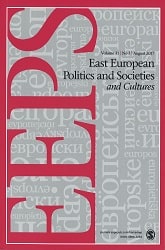Political Intimacy. Power, Laughter, and Coexistence in Late Soviet Lithuania
Political Intimacy. Power, Laughter, and Coexistence in Late Soviet Lithuania
Author(s): Neringa KlumbytėSubject(s): Media studies, Political history, Government/Political systems, Politics and communication, Politics and society, Post-War period (1950 - 1989), Sociology of Politics
Published by: SAGE Publications Ltd
Keywords: political intimacy; laughter; power; subjectivity; Lithuania;
Summary/Abstract: This article explores intersections between power, subjectivity, and laughter by focusing on Šluota (The Broom), a humor and satire journal published by the Central Committee of the Lithuanian Communist Party during late socialism (1970s to mid-1980s). In Lithuania, while the official newspapers and journals were commonly distrusted, The Broom was perceived as a grassroots media. In this article, the author asks how officially sanctioned socialist humor was translated into readers’ sincere laughter; how sensual and political dialogue was created between state authorities, artists, and readers. The author shows that in the case of the official culture of humor presented in The Broom, laughter cannot be easily classified as performance of resistance or support for the regime. In The Broom, the discourse of power was never monologic and simply oppressive. It was situational, contextual, and changing. Officially sanctioned laughter was infused with and mediated by private emotions and values. Moreover, the journal provided space for artistic creativity and self-expression that reshaped official political aesthetics. Laughter blurred the distinctions between the state and the citizen, the public and the private, the hegemonic and the sincere. The author argues that laughter is an experience and a performance of political intimacy through which various agents imagine a self, society, and the state and reproduce various power orders. Political intimacy refers to coexistence of state authorities and other subjects in fields of social and political comfort, togetherness, and dialogue as well as in the zones of shared meanings and values.
Journal: East European Politics and Societies
- Issue Year: 25/2011
- Issue No: 04
- Page Range: 658-677
- Page Count: 20
- Language: English
- Content File-PDF

